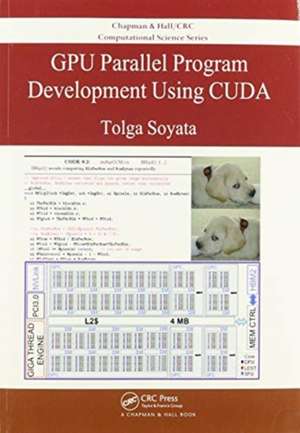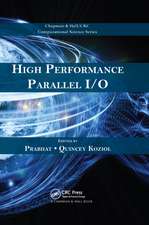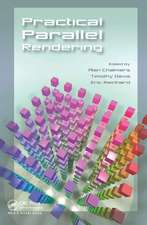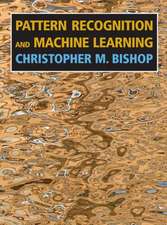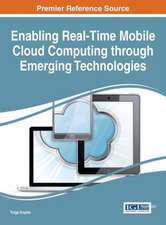GPU Parallel Program Development Using CUDA: Chapman & Hall/CRC Computational Science
Autor Tolga Soyataen Limba Engleză Paperback – 30 iun 2020
The book consists of three separate parts; it starts by explaining parallelism using CPU multi-threading in Part I. A few simple programs are used to demonstrate the concept of dividing a large task into multiple parallel sub-tasks and mapping them to CPU threads. Multiple ways of parallelizing the same task are analyzed and their pros/cons are studied in terms of both core and memory operation.
Part II of the book introduces GPU massive parallelism. The same programs are parallelized on multiple Nvidia GPU platforms and the same performance analysis is repeated. Because the core and memory structures of CPUs and GPUs are different, the results differ in interesting ways. The end goal is to make programmers aware of all the good ideas, as well as the bad ideas, so readers can apply the good ideas and avoid the bad ideas in their own programs.
Part III of the book provides pointer for readers who want to expand their horizons. It provides a brief introduction to popular CUDA libraries (such as cuBLAS, cuFFT, NPP, and Thrust),the OpenCL programming language, an overview of GPU programming using other programming languages and API libraries (such as Python, OpenCV, OpenGL, and Apple’s Swift and Metal,) and the deep learning library cuDNN.
| Toate formatele și edițiile | Preț | Express |
|---|---|---|
| Paperback (1) | 266.27 lei 6-8 săpt. | |
| CRC Press – 30 iun 2020 | 266.27 lei 6-8 săpt. | |
| Hardback (1) | 390.58 lei 6-8 săpt. | |
| CRC Press – 16 feb 2018 | 390.58 lei 6-8 săpt. |
Din seria Chapman & Hall/CRC Computational Science
- 20%
 Preț: 308.16 lei
Preț: 308.16 lei - 20%
 Preț: 303.86 lei
Preț: 303.86 lei - 20%
 Preț: 562.78 lei
Preț: 562.78 lei - 20%
 Preț: 561.14 lei
Preț: 561.14 lei - 28%
 Preț: 444.37 lei
Preț: 444.37 lei - 20%
 Preț: 589.61 lei
Preț: 589.61 lei - 28%
 Preț: 258.20 lei
Preț: 258.20 lei - 20%
 Preț: 362.78 lei
Preț: 362.78 lei - 20%
 Preț: 376.48 lei
Preț: 376.48 lei - 30%
 Preț: 350.76 lei
Preț: 350.76 lei - 20%
 Preț: 373.82 lei
Preț: 373.82 lei - 27%
 Preț: 259.81 lei
Preț: 259.81 lei - 20%
 Preț: 560.02 lei
Preț: 560.02 lei - 30%
 Preț: 259.81 lei
Preț: 259.81 lei - 31%
 Preț: 257.81 lei
Preț: 257.81 lei - 29%
 Preț: 259.81 lei
Preț: 259.81 lei - 20%
 Preț: 381.10 lei
Preț: 381.10 lei - 35%
 Preț: 898.25 lei
Preț: 898.25 lei - 20%
 Preț: 551.86 lei
Preț: 551.86 lei - 20%
 Preț: 825.03 lei
Preț: 825.03 lei - 35%
 Preț: 848.02 lei
Preț: 848.02 lei - 29%
 Preț: 783.36 lei
Preț: 783.36 lei
Preț: 266.27 lei
Preț vechi: 377.78 lei
-30% Nou
Puncte Express: 399
Preț estimativ în valută:
50.96€ • 55.33$ • 42.80£
50.96€ • 55.33$ • 42.80£
Carte tipărită la comandă
Livrare economică 22 aprilie-06 mai
Preluare comenzi: 021 569.72.76
Specificații
ISBN-13: 9780367572242
ISBN-10: 0367572249
Pagini: 476
Dimensiuni: 178 x 254 mm
Greutate: 0.82 kg
Ediția:1
Editura: CRC Press
Colecția Chapman and Hall/CRC
Seria Chapman & Hall/CRC Computational Science
Locul publicării:Boca Raton, United States
ISBN-10: 0367572249
Pagini: 476
Dimensiuni: 178 x 254 mm
Greutate: 0.82 kg
Ediția:1
Editura: CRC Press
Colecția Chapman and Hall/CRC
Seria Chapman & Hall/CRC Computational Science
Locul publicării:Boca Raton, United States
Cuprins
Introduction to Parallelism and GPU Programming. Introduction to Pthreads. Introduction to Multi-threading. Multi-threading Analysis. Introduction to AWS and the first GPU program. Analysis of the first CUDA program. How to run programs outside Amazon, on a different Unix system. How to run programs outside Amazon, on a different Windows system. Introduction to GPU Multi-threading and Global Memory. In-depth look at Global Memory and GPU Threads. Introduction to Shared Memory. In-depth look at Shared Memory. Performance Bottlenecks in GPU Architecture. Compute Capability and PTX. Host-Device Data Movement Mechanism. CUDA Streaming. CUDA Atomics. OpenGL-CUDA Interoperability. OpenGL and Real-Time GPU Processing. Example Applications - Edge Detection (CUBLAS). Example Applications - Sophisticated Image Processing (CUFFT). Example Applications- Elastography Based Tumor Detection (CUSOLVER). Example Applications - Real-Time Face Recognition (OpenCV, CUBLAS).
Notă biografică
Tolga Soyata is an associate professor in the Electrical and Computer Engineering department of SUNY Albany.
Descriere
This book teaches GPU programming by introducing CPU multi-threaded programming and bases GPU massively-parallel programming on this foundation. The differences among families of GPUs are also studied. The book also explores CUDA libraries, OpenCL, GPU programming with other languages and API libraries, and the deep learning library cuDNN
